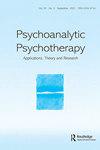Editorial
IF 1.2
Q1 PSYCHOLOGY, PSYCHOANALYSIS
引用次数: 3
Abstract
This is part two of our ‘State of the Psychoanalytic Nation’ Special Issue in which we are publishing papers from around the world describing how psychoanalytic psychotherapy has been developed, implemented and researched within the public sectors of different countries, how psychoanalytic psychotherapists are trained, and how psychoanalytic practitioners locally have responded to the challenges of evidence-based practice. This issue focuses on six European countries – Switzerland, Denmark, Greece, Poland, Luxembourg, and Bosnia and Herzegovina – all of which provide psychoanalytic psychotherapy within their respective national health systems, but this varies considerably due to differences in socioeconomic and political circumstances and in the historical support for psychoanalysis in each country. In contrast to the other countries examined in this volume, and to the majority of countries in the Special Issue as a whole, Switzerland stands out in being a nation that enjoys a high level of support for psychoanalytic psychotherapy, which holds a prominent place in the Swiss public health care system. This is attributed not only to the rich psychoanalytic tradition of the country in which psychoanalytic practice was established in the 1930s, but also to psychotherapy being an integral part of psychiatric training such that the qualification of psychiatrist is a ‘dual title’ of a specialist in both psychiatry and psychotherapy. Several large psychiatry departments have been led by psychoanalysts for years, which has allowed the development and implementation of psychoanalytic psychotherapy. Furthermore, psychoanalytic psychotherapy in Switzerland has a less conflictual relationship than in other nations with the other two predominant psychotherapy modalities – cognitive-behavioural treatment (CBT) and systemic therapy, a state of affairs that the authors attribute to the tradition of Swiss peacemaking and federalism in which the art of consensus and multicultural dialogue is part of the country’s foundation. Similarly, the Grand Duchy of Luxembourg, a small, multicultural country surrounded by Belgium, France and Germany, and where almost half of the population are foreigners, has meant that diverse psychotherapeutic practices sit amicably side by side, inspired by the psychotherapeutic practices predominant in each of the neighbouring countries. Such favourable historical and geopolitical influences which have promoted and sustained the status of psychoanalytic psychotherapy in Switzerland and Luxembourg unfortunately do not exist in most other European countries where psychoanalytic psychotherapy is under threat of being replaced by shorter, more Psychoanalytic Psychotherapy, 2021 Vol. 35, No. 2, 85–88, http://dx.doi.org/10.1080/02668734.2021.1939985编辑
这是我们“精神分析国家的现状”特刊的第二部分,我们在特刊中发表了来自世界各地的论文,描述了精神分析心理治疗是如何在不同国家的公共部门中发展、实施和研究的,精神分析心理治疗师是如何接受培训的,以及当地精神分析从业者如何应对循证实践的挑战。本期关注六个欧洲国家——瑞士、丹麦、希腊、波兰、卢森堡和波斯尼亚和黑塞哥维那——所有这些国家都在各自的国家卫生系统内提供精神分析心理治疗,但由于每个国家的社会经济和政治环境以及对精神分析的历史支持的差异,这一点差异很大。与本卷中研究的其他国家以及特刊中的大多数国家相比,瑞士是一个对精神分析心理治疗享有高度支持的国家,在瑞士公共卫生保健系统中占有重要地位。这不仅归功于20世纪30年代建立精神分析实践的国家丰富的精神分析传统,还归功于心理治疗是精神病培训的一个组成部分,因此精神病学家的资格是精神病学和心理治疗专家的“双重头衔”。几家大型精神病学部门多年来一直由精神分析学家领导,这使得精神分析心理治疗得以发展和实施。此外,与其他国家相比,瑞士的精神分析心理治疗与其他两种主要的心理治疗模式——认知行为治疗(CBT)和系统治疗——的冲突关系较小,作者将这种状况归因于瑞士缔造和平和联邦制的传统,在这种传统中,共识和多元文化对话的艺术是国家基础的一部分。同样,卢森堡大公国是一个被比利时、法国和德国包围的多元文化小国,几乎一半的人口是外国人,这意味着受每个邻国主导的心理治疗实践的启发,各种心理治疗实践友好地并肩而行。不幸的是,这种有利的历史和地缘政治影响促进和维持了精神分析心理治疗在瑞士和卢森堡的地位,但在大多数其他欧洲国家却不存在,因为这些国家的精神分析心理疗法正面临被更短、更具精神分析性的心理疗法取代的威胁,2021年第35卷,第2期,85-88,http://dx.doi.org/10.1080/02668734.2021.1939985
本文章由计算机程序翻译,如有差异,请以英文原文为准。
求助全文
约1分钟内获得全文
求助全文
来源期刊

Psychoanalytic Psychotherapy
PSYCHOLOGY, PSYCHOANALYSIS-
CiteScore
1.30
自引率
37.50%
发文量
22
期刊介绍:
Psychoanalytic Psychotherapy publishes original contributions on the application, development and evaluation of psychoanalytic ideas and therapeutic interventions in the public health sector and other related applied settings. The Journal aims to promote theoretical and applied developments that are underpinned by a psychoanalytic understanding of the mind. Its aims are consonant with those of the Association for Psychoanalytic Psychotherapy in the NHS (APP in the NHS) in promoting applied psychoanalytic work and thinking in the health care system, across the whole age range.
 求助内容:
求助内容: 应助结果提醒方式:
应助结果提醒方式:


